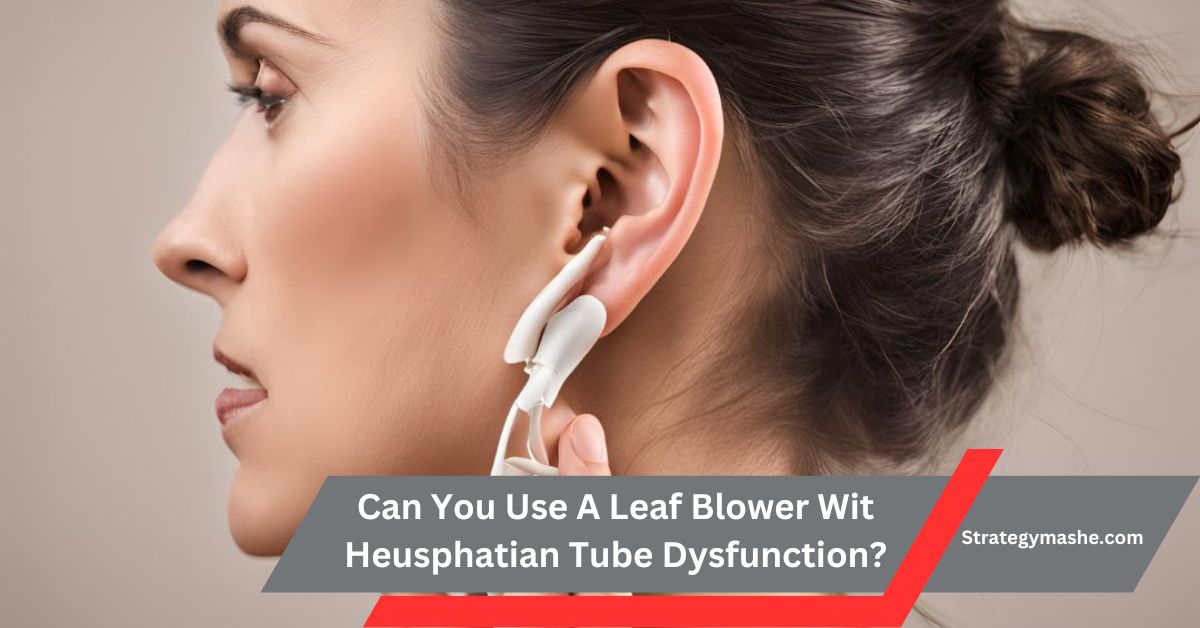
Eustachian Tube Dysfunction (ETD) is a condition that affects the ear’s ability to regulate pressure and drain fluid. People with ETD often experience symptoms like ear pain, a feeling of fullness, and difficulty hearing. For those who love gardening or need to maintain their outdoor spaces, the question may arise: Can you use a leaf blower with Eustachian Tube Dysfunction?
This article provides a detailed exploration of the potential risks and considerations of using a leaf blower when you have Eustachian Tube Dysfunction. We’ll cover the basics of ETD, how leaf blowers might affect it, safety tips, and alternatives. Whether you’re a homeowner, landscaper, or someone who just loves gardening, this guide will help you make informed decisions.
Understanding Eustachian Tube Dysfunction (ETD)
What is the Eustachian Tube?
The Eustachian tube is a narrow passage that connects the middle ear to the back of the throat and nasal cavity. It plays a crucial role in maintaining ear pressure balance and allowing fluids to drain from the ear.
What is Eustachian Tube Dysfunction?
Eustachian Tube Dysfunction occurs when the tube fails to open properly, leading to an imbalance in ear pressure. This can cause a variety of symptoms, such as:
- Ear pain or discomfort
- A feeling of fullness in the ear
- Tinnitus (ringing in the ears)
- Hearing difficulties
- Dizziness
Causes of Eustachian Tube Dysfunction
ETD can be caused by various factors, including:
- Allergies
- Sinus infections
- Colds and flu
- Nasal polyps
- Altitude changes (such as during flying or driving in the mountains)
- Structural abnormalities in the ear or tube
Leaf Blowers: What You Need to Know
What is a Leaf Blower?
A leaf blower is a tool commonly used in gardening and landscaping to blow leaves, grass clippings, and debris into a pile for easy disposal. There are various types of leaf blowers, including gas-powered, electric, and battery-operated models.
How Do Leaf Blowers Work?
Leaf blowers work by generating a powerful stream of air that propels debris. The high-speed air can reach over 200 mph in some models, making them extremely effective for clearing large areas quickly.
Potential Health Risks of Using a Leaf Blower
While leaf blowers are convenient, they can also pose some health risks, especially for those with existing conditions like Eustachian Tube Dysfunction. The high noise levels, vibration, and rapid air movement generated by leaf blowers can potentially exacerbate ETD symptoms.
Can You Use a Leaf Blower with Eustachian Tube Dysfunction?
The Impact of Noise Levels
One of the primary concerns with using a leaf blower when you have Eustachian Tube Dysfunction is the noise. Leaf blowers can produce noise levels ranging from 70 to 110 decibels (dB), which is well within the range that can cause hearing damage over time.
For someone with ETD, loud noises can be particularly problematic. The Eustachian tube’s malfunction can lead to heightened sensitivity to sound, making the loud noise from a leaf blower not only uncomfortable but potentially harmful.
Air Pressure and Eustachian Tube Dysfunction
Leaf blowers create a significant amount of air pressure. While this is effective for clearing leaves, it can be problematic for individuals with Eustachian Tube Dysfunction. The rapid air movement near your head could potentially exacerbate pressure imbalances in your ears, worsening ETD symptoms like pain and fullness.
Vibration and Its Effects
Many leaf blowers, particularly gas-powered models, produce considerable vibrations. For those with ETD, these vibrations can further irritate the delicate structures of the ear and worsen symptoms.
Environmental Considerations
Leaf blowers can also kick up dust, pollen, and other allergens. For someone with Eustachian Tube Dysfunction, exposure to these allergens could trigger or worsen ETD symptoms, especially if allergies are a contributing factor to their condition.
Safety Tips for Using a Leaf Blower with Eustachian Tube Dysfunction
If you need to use a leaf blower and have Eustachian Tube Dysfunction, here are some tips to help minimize the risk:
1. Choose a Quieter Model
- Opt for electric or battery-operated leaf blowers, which are typically quieter than gas-powered ones.
- Look for models specifically designed to be low-noise.
2. Use Hearing Protection
- Wear high-quality earplugs or noise-canceling headphones to reduce the impact of loud noise on your ears.
- Ensure the hearing protection is comfortable and doesn’t put pressure on the ears, as this could worsen ETD symptoms.
3. Limit Exposure
- Try to limit the time you spend using the leaf blower to minimize exposure to noise and vibrations.
- Take breaks frequently to give your ears a chance to recover.
4. Maintain a Safe Distance
- Keep the leaf blower at arm’s length and avoid directing the air stream near your head.
- Use the blower on a lower setting if possible to reduce air pressure.
5. Stay Hydrated and Avoid Allergens
- Drink plenty of water to stay hydrated, as dehydration can exacerbate ETD symptoms.
- Wear a mask to reduce inhalation of dust and allergens.
6. Consult with a Healthcare Provider
- Before using a leaf blower, consult with a healthcare provider, especially if your ETD symptoms are severe.
- Follow any specific recommendations or precautions they may provide.
Alternatives to Using a Leaf Blower
If you find that using a leaf blower exacerbates your Eustachian Tube Dysfunction symptoms, there are alternatives to consider:
1. Raking
- Traditional raking is quieter and eliminates the issues of noise and vibration. While it may be more labor-intensive, it can be a safer option for those with ETD.
2. Electric Leaf Vacuums
- These devices work similarly to leaf blowers but suck up debris instead of blowing it away. They tend to produce less noise and may be a better option for those with ETD.
3. Hiring a Professional
- If maintaining your yard becomes too challenging due to ETD, consider hiring a professional landscaping service. This can save you from potential discomfort and allow you to enjoy a well-maintained yard without the hassle.
FAQs
Q1: Can loud noises from a leaf blower permanently damage my ears if I have Eustachian Tube Dysfunction?
- Answer: Loud noises can worsen symptoms of ETD and potentially lead to hearing loss if exposure is prolonged. Always use hearing protection to minimize risks.
Q2: Is it safe to use a leaf blower if I have mild Eustachian Tube Dysfunction?
- Answer: It may be safe with precautions, such as using a quieter model, wearing hearing protection, and limiting your exposure. However, consulting with a healthcare provider is recommended.
Q3: What should I do if my ETD symptoms worsen after using a leaf blower?
- Answer: Stop using the leaf blower immediately and consult with a healthcare provider. They can provide guidance and treatment options to manage your symptoms.
Q4: Can allergies triggered by leaf blowers worsen Eustachian Tube Dysfunction?
- Answer: Yes, exposure to allergens can worsen ETD symptoms, especially if allergies are a contributing factor. Wearing a mask and taking allergy medications can help reduce this risk.
Q5: Are there any leaf blower models specifically designed for people with Eustachian Tube Dysfunction?
- Answer: While no models are specifically designed for ETD, quieter, low-vibration models may be better suited for individuals with this condition.
Conclusion
Using a leaf blower with Eustachian Tube Dysfunction requires careful consideration and precaution. The noise, vibrations, and air pressure generated by these tools can potentially worsen ETD symptoms. However, by choosing the right equipment, using proper protection, and following safety tips, you can minimize the risks and maintain your outdoor spaces effectively.





